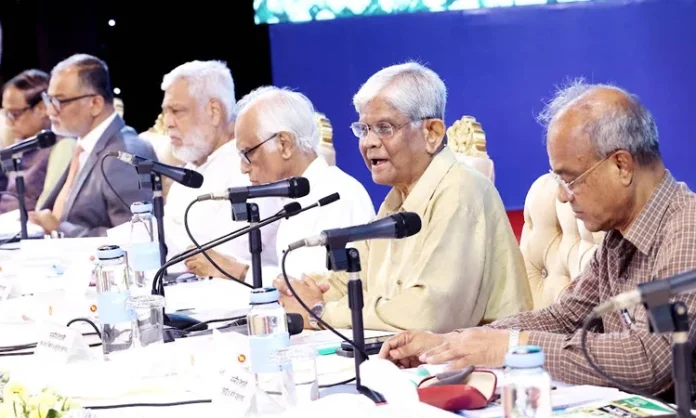Finance Adviser Dr. Salehuddin Ahmed has described the proposed budget for FY2025–26 as both people-centric and business-friendly, emphasizing a shift in focus from mere economic growth to improving the quality of life for ordinary citizens.
Speaking at a post-budget press conference organized by the Ministry of Finance at the Osmani Memorial Auditorium in Dhaka, Dr. Ahmed acknowledged the challenges of crafting a fully business-friendly budget, citing the trade-offs required for revenue generation.
“If taxes are reduced in one sector, they must increase in another. A sudden spike in revenue isn’t realistic,” he said. “This time, the budget prioritizes simplicity and transparency in daily life over chasing high growth.”
Dr. Ahmed noted that while previous budgets heavily emphasized GDP growth, the benefits were not inclusive. “This year, we’ve tried to address real challenges—focusing on inflation control, banking reform, capital market stability, and energy sector restructuring.”
He also pointed out that the current government inherited a difficult economic situation. “Some said the country was in the ICU, especially the financial sector, which was near collapse. But through coordinated efforts, we’ve brought stability. Inflation is being controlled, and measures are underway to bring greater relief to the public.”
A significant feature of this year’s budget, he said, is its reduced size—a first in recent memory. “This isn’t just a continuation of past practices. We’ve introduced a three-year strategic plan to address structural weaknesses and improve governance transparency.”
Planning Adviser: Budget Aims to Break Debt Cycle
Planning Adviser Dr. Wahiduddin Mahmud described the budget as “realistic,” emphasizing efforts to break the cycle of debt and address long-standing project mismanagement.
“The aim is to end the vicious circle of borrowing and repayment,” he said, while acknowledging that such structural changes cannot be achieved through a single budget.
He explained that most of the projects included in the current budget were initiated by the previous government—often for political purposes and without adequate financial scrutiny.
“Of the 1,300 projects, only 20 to 30 are new, and even those were included in the previous fiscal year’s budget. These are not initiatives of the current administration,” he clarified. “Our priority has been to eliminate unnecessary projects and clean up the legacy issues left by the previous government.”
Energy Adviser: Budget Tackles Public Sector Waste
Adviser for Power, Energy and Mineral Resources Muhammad Fouzul Kabir Khan termed the proposed budget “exceptional,” highlighting its focus on reducing waste in public expenditure.
He noted a key reform involving the removal of VAT on LNG imports. “This VAT created negative value addition, as gas is imported at Tk60–65 per unit and sold at Tk30. The VAT made no economic sense and has now been removed,” he said.
Khan added that the government has reduced LPG and fuel prices to support Bangladesh Bank’s inflation-control measures, which will in turn lower transport and production costs. He also mentioned initiatives to curb extortion on highways to ease the public’s cost of living.
Bangladesh Bank Governor Optimistic About Inflation Control
Bangladesh Bank Governor Dr. Ahsan H. Mansur expressed optimism that inflation would fall below the 6.5% target set in the proposed budget, citing stable macroeconomic indicators and a steady exchange rate.
Speaking at the press conference, Dr. Mansur said, “The target is 6.5%, but I believe we can surpass that.”
He identified the stable exchange rate—hovering around Tk122–123 per USD—as a crucial factor in curbing inflation. “This has helped maintain confidence and stabilize prices,” he said.
He reported notable declines in both food and non-food inflation. “Food inflation has fallen from double digits to 8.5%, and non-food inflation has dropped from 11.5% to just over 9%. This trend is promising and expected to continue.”
The governor also credited tight monetary policy and favorable global conditions, including stable oil and gas prices and improved export performance, for helping rein in inflation. “Together, these efforts will help bring inflation below the target,” he concluded.
Agriculture Adviser Reports Strong Harvest, Cold Storage Plan
Agriculture Adviser Lt. Gen. Md. Jahangir Alam Chowdhury (retd) reported a bumper harvest, with over 15 lakh metric tonnes of Boro paddy produced this year—alongside higher-than-average yields in vegetables, potatoes, onions, maize, and ginger. Wheat production has also slightly increased.
He noted that 85% of the Boro harvest is complete, with harvesting still ongoing in some areas of Rajshahi and Rangpur.
The adviser also announced plans to build 100 small cold storage facilities to help preserve agricultural products during the transitional period between winter and summer. Additionally, four large cold storage facilities are planned for construction to further strengthen post-harvest infrastructure.

